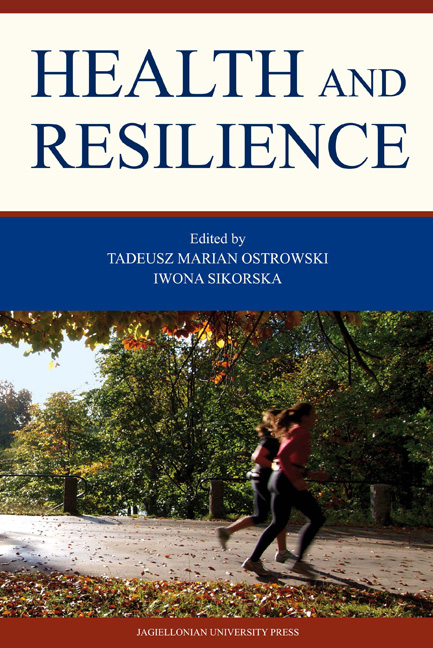Book contents
- Frontmatter
- TABLE OF CONTENTS
- Introduction
- I SOCIAL AND METHODOLOGICAL CONTECTS OF RESILIENCE
- Resilience in the light of research and theoretical reflection
- Naturalism, normativism and Havi Carel's phenomenological approach to health and illness
- Testing the sense of identity in people with highly functioning autism as theory-methodological problem
- “The beneficial life stories.” Health and mental resilience from the narrative perspective
- II RESILIENCE IN DEVELOPMENT
- III RESILIENCE AND DISEASE
- List of Authors
Naturalism, normativism and Havi Carel's phenomenological approach to health and illness
from I - SOCIAL AND METHODOLOGICAL CONTECTS OF RESILIENCE
Published online by Cambridge University Press: 05 December 2014
- Frontmatter
- TABLE OF CONTENTS
- Introduction
- I SOCIAL AND METHODOLOGICAL CONTECTS OF RESILIENCE
- Resilience in the light of research and theoretical reflection
- Naturalism, normativism and Havi Carel's phenomenological approach to health and illness
- Testing the sense of identity in people with highly functioning autism as theory-methodological problem
- “The beneficial life stories.” Health and mental resilience from the narrative perspective
- II RESILIENCE IN DEVELOPMENT
- III RESILIENCE AND DISEASE
- List of Authors
Summary
“My body is me. This is an essential feature of our embodied existence that is brought out be illness. Illness is an abrupt, violent way of revealing the intimately bodily nature of our being.”
Carel, 2008, p. 27Abstract
The notions of health, disease, and illness as essentially applicable in all medical contexts have been extensively discussed within contemporary philosophy of medicine. Among the variety of perspectives offered there are two which seem to be currently dominating: the naturalistic and the normativist ones. The former approach, as represented by Boorse's biostatistical theory, tends to focus on the notion of disease, which is understood in terms of an impairment of statistically normal biological functioning. The latter one in turn, as developed for instance within the action-theoretical theory of Nordenfelt, denies the possibility of specifying health and illness in purely objective biological terms and provides an openly normative framework which is founded on the notions of human ability and vital goals. These two approaches, though obviously different in many nonnegligible aspects, still share one crucial feature: they are formulated from a third-person perspective and use third-person language, accordingly. Having made this point, Carel intended to develop a perspective which would do justice to first-person experiences, especially to those of an ill person. The phenomenological framework offered by her as well as its philosophical sources are briefly scrutinised.
- Type
- Chapter
- Information
- Health and Resilience , pp. 25 - 38Publisher: Jagiellonian University PressPrint publication year: 2014



